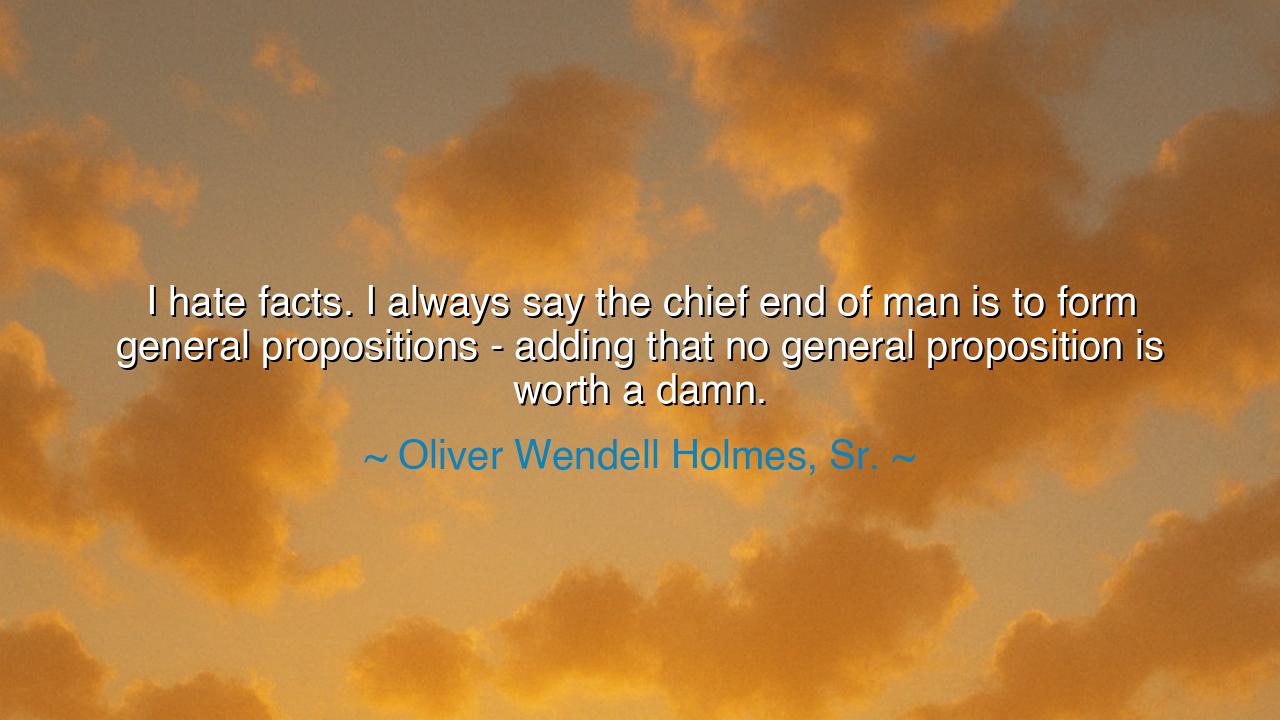
I hate facts. I always say the chief end of man is to form
I hate facts. I always say the chief end of man is to form general propositions - adding that no general proposition is worth a damn.






"I hate facts. I always say the chief end of man is to form general propositions - adding that no general proposition is worth a damn." These striking words from Oliver Wendell Holmes, Sr. challenge the very nature of how we view knowledge, truth, and human understanding. At first glance, his disdain for facts might seem perplexing. After all, in a world governed by reason, empiricism, and the relentless pursuit of scientific knowledge, facts are often seen as the building blocks of our understanding. But Holmes, in his irreverence, reminds us that while facts provide the foundation, it is the general propositions, the sweeping ideas, that give meaning and context to our lives. It is not enough to merely know facts; one must seek to understand their interconnectedness and their place in the grand tapestry of human existence.
In the ancient world, the great philosophers were not content to merely catalogue facts or details. Socrates, for instance, did not simply teach his followers a series of facts about the world; instead, he challenged them to ask questions, to question assumptions, and to seek wisdom through the pursuit of general propositions about life, ethics, and knowledge. He believed that true wisdom lay not in the accumulation of facts, but in the deeper understanding of concepts and ideas. Like Holmes, Socrates recognized that while facts might guide us, it is our ability to form ideas, to grasp the underlying principles of life, that truly defines our humanity.
Holmes' view is not an attack on the value of knowledge or fact-finding but a critique of narrowness. Consider the example of Galileo, whose observations of the heavens and his support of the heliocentric model were based on empirical facts, yet his ideas—his general propositions—challenged centuries of accepted thought. Galileo did not simply present a collection of facts about the stars and planets; he reinterpreted them, offering a sweeping new vision of the universe, one that ultimately changed the very course of human understanding. The facts he presented were groundbreaking, but it was his proposition, his idea about the structure of the cosmos, that sparked a revolution in scientific thought.
Indeed, history is full of those whose general propositions transformed the course of humanity. Isaac Newton, for example, did not merely observe the movements of objects. His general propositions about gravity and motion synthesized the facts of the natural world into a unified theory that could explain the cosmos. Newton’s laws of motion were not mere facts about the world around us, but a bold and transformative way of understanding the forces that govern it. In this way, general propositions—even when they challenge the established facts—have the power to create paradigms that change the course of history.
Holmes, in his view, suggests that human progress lies not in the accumulation of facts, but in the ability to form ideas—to generalize, to seek meaning and purpose. It is the idea of justice, not the specific laws of a country, that guides the moral compass of a society. The general proposition that all humans are equal under the law is what drives the struggle for civil rights. Martin Luther King Jr., for example, did not simply rely on the facts of racial inequality; he rallied people around a general proposition: that all men and women are created equal, and that this truth should be reflected in every aspect of life. It was this proposition—this idea—that gave meaning to the facts of racial injustice and inspired change.
However, Holmes’ statement also calls attention to the danger of over-simplification. General propositions, if left unchecked by the nuance of individual experience, can become dogmatic and rigid. Consider the dangers of adhering to general propositions without allowing for adaptation and reflection. Throughout history, ideologies and philosophies have often become weapons when divorced from the reality of lived experience. Totalitarian regimes in the 20th century, for example, adhered to sweeping general propositions about race, class, or nationhood, but those propositions, devoid of compassion and understanding, led to oppression and suffering. Holmes' critique, then, is not only of the fact-based approach but also of an unquestioning adherence to general propositions that fail to account for the complexity of human life.
The lesson in Holmes’ words, then, is one of balance. Facts are essential—they provide the foundation upon which we build our understanding of the world. But they must never be the end in themselves. Ideas—bold general propositions—give meaning to the facts, offering a way to see the larger picture, to understand the forces that shape society, nature, and human experience. Yet, as we craft these ideas, we must remain mindful of their limitations, constantly testing them against the reality of human experience. Like the great thinkers of history, we must learn to weave together facts and ideas, using them not as opposing forces, but as complementary tools to understand and improve the world.
In your own life, reflect on how you approach the knowledge you encounter. Do you seek only to gather facts, or do you also strive to form ideas that make sense of those facts? Are you able to synthesize knowledge, seeing beyond the surface and discovering the deeper principles that connect us all? Holmes’ words challenge us to move beyond the accumulation of facts and toward the formation of ideas that shape our actions, our beliefs, and our world. Seek not only to know, but to understand. Seek not only to accumulate, but to create—because it is in the realm of ideas and general propositions that we find the true meaning of knowledge and progress.






AAdministratorAdministrator
Welcome, honored guests. Please leave a comment, we will respond soon